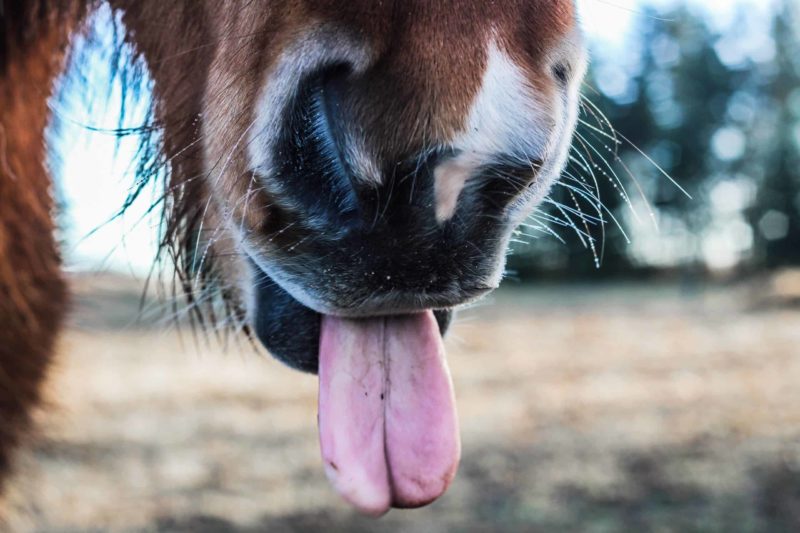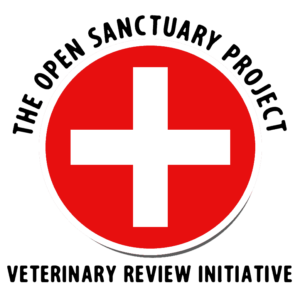

Veterinary Review Initiative
This resource has been reviewed for accuracy and clarity by a qualified Doctor of Veterinary Medicine as of January 2023.
Check out more information on our Veterinary Review Initiative here!
Have you had a dental check up recently? Have your equine residents? Those new to providing sanctuary to equine residents may be surprised to learn that dental checks and procedures (the most common being referred to as “floating”) are a vital element in keeping residents healthy and happy. In addition, equines who have proper and regular dental care live longer. Within most sanctuary contexts, it is nearly impossible to provide equines with enough grazing to wear down their teeth in a natural way. This can cause serious issues as their teeth grow continually throughout their life. The way in which their teeth become worn down often causes irregular, sharp points, which can cause injuries and ulcers in their mouths, making eating painful. This resource covers the basics of equine dental care.
Equine Dental Care Basics
All equine residents should have at least one dental check-up a year. This interval may need to increase to twice a year based on age (young residents and senior residents) and health. In fact, age can be estimated by a professional during a dental exam. Part of an equine dental health plan includes “floating” their teeth. This is a necessary procedure done by veterinarians at least once per year. After an oral examination, an equine dentist or veterinarian will use a small rasp or file (called a float) to gently file down any sharp edges or hooks on their teeth and create a level surface to help the equine resident chew more efficiently and prevent injury and discomfort.
Exams may include a brief assessment of the external (jaw) and internal parts of the oral cavity. Still, a full assessment is generally necessary and may include an examination of the lips, cheeks, lymph nodes, tongue, gums, palate, and teeth. The exam may require sedation in some equines, as the mouth may be flushed and a mouth speculum placed so the veterinarian can fully examine the inside of the equine resident’s mouth. Sometimes radiography may be suggested.
Knowing Your Residents
Given the intrusive nature of dentistry, it is important to understand the personality of each equine resident and their reactions to potentially scary and new things. If you know they tend to be afraid of touch near their mouths or are just generally nervous, then helping them get accustomed to someone and tools being near them can be beneficial for both the safety of staff, veterinarians, and, of course, the safety and comfort of the resident in question. Positive reinforcement trust-building exercises are a great way to create an environment where everyone feels a little more comfortable.
Age Factors
As you may have guessed, there are different concerns for foal dental development, adolescent, adult, and mature equines. While all equines should receive at least yearly dental exams, foals up to 18 months should be checked specifically for any possible tooth or jaw malformation at time of falling and a few months later and then every 6 months or so unless otherwise advised by an experienced veterinarian. Adolescent equines (18 months to 4-5 years of age) should be checked twice a year, as they will start losing their 24 baby teeth around 2 years of age or so, and 36 to 44 new adult teeth will erupt. During this time, they may have stubborn baby teeth that need removal, the removal of wolf teeth, and are particularly susceptible to sharp enamel points that can cause injuries in the mouth. Senior horses can actually “run out of teeth ” and develop periodontal disease and may require more than one dental check a year.
Types Of Dental Problems Equines Face
- Jaw conformation
- Periodontal disease
- Retained baby teeth
- Misalignment
- Sharp edges on teeth that cause lacerations and ulcers in the mouth
- Abscesses
- “Running out” of teeth
Signs Of Equine Dental Problems
It is important to observe your resident equines for any of the following symptoms, as early detection and intervention can prevent more serious problems:
- Dropping food while eating
- Avoiding eating grain
- Bad smelling breath or mouth
- Refusal to eat
- Rotating their head while chewing
- Tongue rolling
- Spitting out half-chewed wads of hay or forage (Sometimes referred to as “quidding”)
- Weight loss
- Strange “slurping” sounds while chewing
- Excessively salivating
- Lumps on jaw
- Taking longer than usual to eat
- Nasal discharge
- Bleeding coming from the mouth
- Sharp points on front of first lower or upper molars
- Long stems of hay or grass in the manure
The more often your resident equines have access to pastures with foraging opportunities, the more likely their teeth will wear down. However, it is unlikely to fully wear their teeth down in a way that is necessary. This is where equine veterinarians and dental practitioners come in! Hopefully this introduction has provided useful information to help you and your staff give equine residents a happy and healthy life.
SOURCES:
Horse Dental Care And Equine Dentistry | Best Friends
The Importance Of Equine Dental Care | Pilchuck Veterinary Hospital
Equine Dental Care: The Full Story | Irongate Equine Clinic
Basic Dental Care For Horses | USDA Cooperative Extension (Non-Compassionate Source)
Non-Compassionate Source?
If a source includes the (Non-Compassionate Source) tag, it means that we do not endorse that particular source’s views about animals, even if some of their insights are valuable from a care perspective. See a more detailed explanation here.








